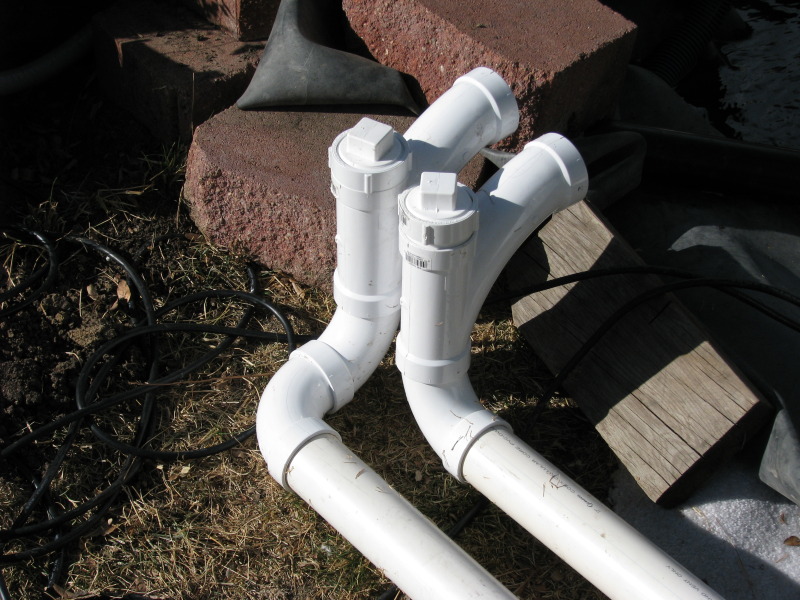I was thinking tonight, the one area of concern I've always had with running my pumps through the Winter is in the water pipes. If the pump stops, there is always the chance of the line freezing up. I was considering tonight the possibility of adding small heaters right in the pipe where the pump connects? My pipes are 2" and begin with a Y that has a threaded cap on top (for cleaning, easy access, whatever), so I'm wondering if anyone has thoughts on some kind of heater that I could modify into a threaded fitting?
I'm not trying to heat the entire pond with this, I simply want to add enough heat inside the pipes to balance the heat that will be leeched into the ground through nearly 30 feet of pipe. The other issue is the rate of flow... each pump pushes 2900gph. Obviously at that rate I'm not going to be adding more than a minuscule amount of heat to the water, however I'm hoping for a cumulative effect - a little heat over a long period of time, building up a slight pocket of warmth in the ground around the pipes..?
Shdwdrgn,
If you are pumping that kind of a volume of water, you don't need to worry about heating the pipes. Especially if they run underground, even if they are just a few inches below grade. They will not freeze on you unless you lose power or the pump quits. Even then, it will take a while for the water in the pipes to freeze (especially in a 2" diameter pipe).
If you lose power, pipe heat tape or any insertion heater won't help you anyway. They will be without power, too, of course.
Now, if the pump itself fails, you lose your flow, and then the water may start to freeze. My idea here would be to install a water flow switch in each of your lines. If the pump stops, the switch changes state and could trigger an audible alarm in the house. Heck, you could even wire that into your door-bell or something. Just something to notify you that the water has ceased flowing. If it were the pump, you could quickly check out what the problem was and either replace the pump or remove an obstruction.
You are in Colorado, I am in Nebraska. Our weather doesn't get that bad (cold) for that long. There was one month years ago where the temp here didn't get above 0°F for a high, but rarely does it get below -15°F and stay there. Your flow rate from the pump/s will maintain open water unless we really get doggone cold (like -20°F for days).
There are some areas where you should be concerned... Small diameter pipes with low water flow and any filter tanks or vessels that are passive and unprotected (unsheltered) and any drain or overflow lines and valves. I would especially be concerned with overflow or drain lines as the moving water won't circulate through them and they could easily ice up and break. If, say a drain line of valve iced up and broke, you would lose your water from the system, then your pump may run dry and kill it and run your pond or tank dry too! Then your fish would go the way of Clarence Birdseye (fozen entree's). NOooooo!
For those smaller pipes or areas I would recommend heat tape. It is thermostatically controlled and won't turn on until the temp gets too low. You just wrap it around the pipe and tape it in place in a few spots. Add some foam rubber pipe insulation around it to insulate it even more.
It is all extremely easy to set up and costs very little to purchase or operate. The heat tape does not get very hot, so it works well with PVC or CPVC piping or PEX tubing (it won't melt it).
Good luck this winter my friend!
Gordy (catfishnut)


